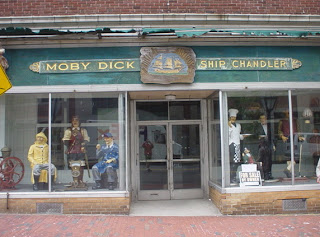My betrothed and I had the day off together yesterday (how nice), and decided to nip down-state a ways to visit New Bedford and see a bit of Melvilliana. Since I just finished Moby Dick a couple weeks ago (see all related posts
here), I thought it would be fun.
The day turned out to be full of surprises, some great, some not. The first was that the famous Whaling Museum (located at 18 Johnny Cake Hill – top that address) was closed. It seems the president of Portugal was visiting the town this random Friday afternoon, and various worthy tourist sites were closed. (We checked the Web site before coming, but, sadly, missed the small warning text that was posted. The visit was likely an homage to the large population of Portuguese in New Bedford.) This was, without a doubt, a let-down. The museum looks to be very good. The visitor’s center did have a neat scale model of a whaling ship of nearly the same vintage as the Pequod, though, so all was not lost.
The town itself looks a bit depressed, like many functional seaport towns. If you’ve been to Gloucester, Mass., you have the general idea. Many empty storefronts, lackluster antiques stores with a few dusty baubles in the window, and a hundred convenience stores. There are some local employers, mostly branches of national concerns such as phone companies and banks. And your usual nicely renovated mill buildings, etc., two-thirds filled with professionals of various stripes. The whole thing has a certain down-at-heel charm, but you walk around feeling a bit concerned, as you would for an aging uncle who was an interesting conversationalist on certain topics, but generally seemed like he just might be going slowly to seed.
We stopped at the
Seamen’s Bethel, where Father Mapple preached fire, brimstone and stormy seas in the famous chapter from
Moby-Dick. It was interesting, humble and well-kept. The prow-shaped pulpit is right there at the front of the church, but we found out that it was not originally part of the building. That little feature sprang whole from Melville’s prodigious brow. However, visitors were so disappointed after traveling to New Bedford and not seeing the ship-shaped pulpit, that the church was basically forced to put one in. It works, in its own weird way. We also sat in Melville’s pew, and read some of the cenotaphs commemorating sailors who’d died at sea – also noted memorably in the book.
From there, we wandered down to a 19th Century
schooner docked in the harbor. We were hoping to roam the deck a little, as we’d been told might be possible. We found the same bored police presence in front of the boat that we saw at the museum. Presumably, the officer was protecting the site for the absent foreign president (not due in town for two hours). He sullenly honked his horn and waved us off, without even opening the window of the car to speak to us. Does this town really rely on tourism for income?
The saving grace of the day was the
Whaling Museum Research Library. This is housed in a separate building, a relatively easy walk from the other sites. The betrothed is a librarian, so, needless to say, we both have warm feelings toward such institutions. Our esteem was not wasted. Unlike most other places in town, they welcomed us, despite the fact that they were closing at 4:00, and it was 3:55. Lovely editions of Melville abounded, of course, along with antique ship’s logs, scrimshaw, and whatever other exhibits the small (but appealing) space would allow. I overheard two librarians discussing a 19th century ship’s log detailing a very successful voyage to Java, including entries for all kinds of quirky expenses.
Best of all, I waylaid a head librarian just at closing time and managed a short talk with him. I asked him if he had a background in maritime history before working there, and a wave of righteous anger rose to the surface. “No,” he replied, color rising in his face, “I had 24 years of schooling before I arrived here, and not one course of study on maritime history!” With his knitted brow and sharp tone of voice, at first I thought he was angry at me for some reason. But he was just extremely chagrined at the way that part of our history is ignored in the public curricula. "This was a maritime nation up until a certain point in the 19th Century!" he said. Walking to the car, the betrothed and I agreed that we had loved his passionate anger on behalf of quality education. Had the museum been open, we probably would have missed this little treasure of a library.
Later, we slid down to the spit of land just south of town and caught some sun for an hour on a small, pretty beach that was all but deserted (this was the other saving grace of the day). We had a decent seafood dinner, walked the pleasant, middle-class seaside neighborhood a bit, and pointed the car toward Boston.
I’ll post pictures as soon as we get them off the camera.



